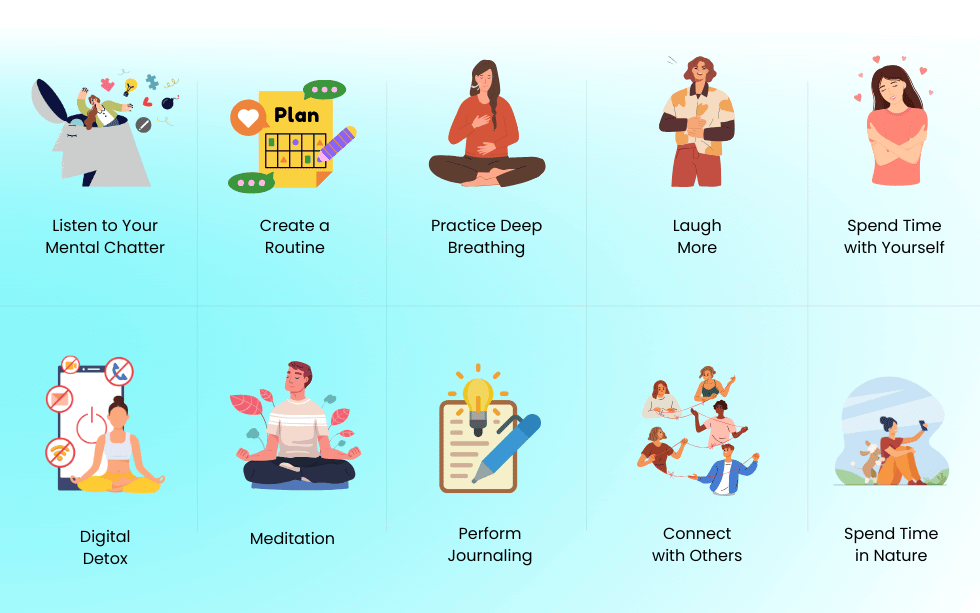Are you stressed out? Do you find yourself drained and stressed after a long day? Don’t worry, here are some effective ways of relieving stress that can help you out.

Stress is mainly associated with anxiety and depression, although it is not the same mental health condition. This modern lifestyle is fast-paced, and most people are busy grinding in their lives. 9 out of 10 people have claimed that they are stressed in life, and this is a prevailing situation in most countries. People are looking forward to knowing ways to bust stress as chronic stress is the leading cause of heart diseases, anxiety disorders, and depression, and cases are increasing on a daily basis. While adults are a part of it, a huge number of youth are also facing the same issue.
Stress can be caused by many reasons, and a person can become vulnerable to stress due to certain factors, which can also be societal, mental, and very personal, due to the pressure of workplace culture, and it is quite concerning, considering the wide array of effects. Let’s take a better look at these factors.
- Genetics and hereditary issues that are passed on for generations
- Lack of Social support for the struggling individuals
- The coping mechanism is different for everyone, and when you cannot cope with a situation, it causes a tremendous amount of stress.
- Different personality types
- Discrimination due to race, gender, or perceived gender, LGBTQIA+, socioeconomic status, or other factors
- Child Trauma is a leading cause of stress that stays for the rest of one’s life when not diagnosed.
- Professional hazards are also a leading cause in this case, and in the age of AI, people are also stressed about losing their jobs.
If you are wondering what the best ways to de-stress yourself are, here are 16 effective ways or habits that allow you to navigate through your stressful life and find more peace within.
16 Ways of Relieving Stress Effectively
- Get into More Physical Activities
A 6-week study of 185 university students revealed that participating in aerobic exercise 2 days per week significantly reduced overall perceived stress and perceived stress due to uncertainty. The medical experts recommend 150 minutes of moderate-intensity exercise per week, as well as two days of muscle-strengthening activity. It does not have to be an intense workout routine that you follow regularly, but you have to exercise at least 2-3 days a week, which can help relieve stress from your mind and body. Simple cardio routines can also be helpful, which include running, walking, swimming, hiking, cycling, etc, and many others. Don’t stay inactive and try to engage yourself through light exercises that help boost your blood circulation and cardiac health. Remember, consistency is the key here that helps to continue it in the long run.
- Try Eating a Balanced Diet
According to a study in 2022, people who follow a diet high in ultra-processed foods and added sugar are more likely to experience higher perceived stress levels. That is why consuming fast food, packaged products, oily snacks, and sugary desserts is being prohibited by most medical professionals, as it can significantly ruin your health. Additionally, being chronically stressed may lead you to overeat and consume more ultra-processed foods. It is one of the leading reasons why sad and depressed people have weight fluctuation and poor immunity due to their food habits. If you do not eat enough nutrient-dense whole foods, you may increase your risk of deficiencies in nutrients essential for regulating stress and mood, such as magnesium and B vitamins. Try to eat more vegetables, fruits, beans, fish, seeds, etc, that can offer you all the nutrients you need.
- Minimize screen time
In this digital world and electronic device-based lifestyle, we are incredibly dependent on digital screens. However, this overwhelming screen time is also harmful to our health and can cause stress for all. Several studies during the global pandemic and 2021 showcased that excessive smartphone usage causes increased stress levels. It also ruins your sleep schedule. That is why it is important to take off from your daily Netflix routine, as you cannot skip work for that reason. If you are not able to reduce screen time professionally, do it personally.
- Practice Self-care/Self-Love
Self-care is the true form of self-love, which is not only important but mandatory. It does not have any complex definition, as it simply means tending to your well-being and happiness. Self-care activities can help reduce stress. If you are not sure what self-care activities mean, here are some examples that you can try.
- going for a walk outside
- taking a bath
- lighting candles
- reading a good book
- exercising
- preparing a healthy meal
- stretching before bed
- getting a massage
- practicing a hobby
- using a diffuser with calming scents
- practicing yoga
These activities can help you de-stress quickly, and you can do them at hour of the day. However, it is preferable at the end of the day or after a long week when you are most stressed.
- Try Journaling
Yeah, it might sound a little crazy, but journaling can actually help to reduce your stress. See, a journal is a very personal space and your freedom of expression, where you can write down anything. Starting from our daily activities to someone you like or dislike, you can write anything in a journal, and that can help to get rid of a lot of stress off your chest. It provides a positive outlet for your thoughts and emotions. Expressive writing can also help you feel less lonely as you can share.
- Reduce your Caffeine Intake
If you are a coffee-lover, this can be a tough job for you. Too much coffee can actually increase your stress levels, as overconsumption may also harm your sleep, which can increase stress. Coffee does have some medical benefits, but it is good when you are having too much of it. According to the medical experts, the regular intake of coffee should be under 400 mg, which is ample for one person.
- Spend Time with the Loved Ones
Spending time with your friends, family, or partner can be a great way to bust your stress. According to a medical study in 2021, people who receive lower levels of support from friends, family, and romantic partners are more prone to higher perceived stress. In case you are lonely and do not have many people to spend time with, you can also join support groups or join a sports team where you can mingle with other people and talk about life. Celebrate the humane feelings and don’t be afraid.
- Create boundaries and learn to say ‘No’
Boundaries are very important for everyone, whether you are a man, a woman, or someone on the spectrum. It is mandatory to create boundaries, especially with people who add to your stress levels, as it is a healthy way to protect your well-being. That is why you should also learn how to say no to people. Saying “no” to things that will unnecessarily add to your load can reduce your stress levels. These boundaries are not just applicable to strangers but also to the people you know, such as friends or family, whose presence can make you feel overwhelmed.
- Avoid Procrastination
Most people try to procrastinate not because they are lazy but because it is their coping mechanism for increasing stress. Procrastination can cause stress, which negatively affects your health and sleep quality. If you find yourself procrastinating regularly, it may be helpful to make a to-do list. Give yourself realistic deadlines and work your way down the list in order of priority. Always follow the list so that you know what to do next, with the scope to do it later. Start now!
- Join a Yoga Class
The benefits of Yoga are paramount, and everyone should join a yoga class for mental and physical well-being. According to the doctors, yoga can help to reduce stress and promote psychological well-being. It has been proven that Yoga can also help to lower cortisol levels, blood pressure, and heart rate. It increases the level of gamma aminobutyric acid, which is a neurotransmitter that’s low in people with mood disorders.
- Practice Mindfulness
Mindfulness simply means being in the present. Most of us cause stress to ourselves by dwelling on the past that has already passed or thinking about the future that is yet to come. Living in uncertainty is a leading cause of stress, and that is why focusing on your present state and belonging is crucial here. Stress reduction techniques that utilize mindfulness include meditation and mindfulness-based cognitive therapy (MBCT), a type of cognitive behavioral therapy. Constant meditation for shorter periods can actually help to reduce stress and anxiety while instilling more calmness in the mind and body. It is recommended to take professional help in this case.
- Cuddle
This is applicable for people with partners, and if you don’t have anyone to cuddle with, then skip this. According to studies, physical contact can help to relieve stress, and it happens due to hormonal releases. Cuddling or intimate contact can help to release oxytocinTrusted Source and lower cortisol. In turn, these effects help lower blood pressure and heart rate. High blood pressure and increased heart rate are physical symptoms of stress.
- Stay in Touch with Nature
According to research conducted on students, it has been found that spending as little as 10 minutes in a natural setting may help improve psychological and physiological markers of mental well-being, including perceived stress, in college-aged people. It is important to engage in outdoor activities that allow people to be in touch with nature, and it is quite relaxing for people of all ages. Whether you go hiking or camping in the woods, it can help you bust stress. In case you are not very fond of such activities, you can also go to the urban places like parks, botanical gardens, and others.
- Deep Breathing Practices
Breathing practices are great for stress reduction, which include diaphragmatic breathing, alternate nostril breathing, box breathing, and many others. The breathing practices help to focus your awareness on your breath, making it slower and deeper. When you breathe in deeply through your nose, your lungs fully expand, and your belly rises. This helps slow your heart rate. Based on this, the yogis and sadhus of India have spent years in meditation only.
- Have a Pet of Your Choice
Well, having a pet is like having your own children, and you can give them unconditional love without looking for something in return. When you spend time with your pet, cuddle them or pet them, and feed them, it offers a great sense of joy. It helps your body to release oxytocin, which is a hormone linked to positive moods. Therefore, you can embrace positivity with your pet. They can provide you with constant companionship and keep you active. There are also emotional support animals as pets who can help with your well-being.
- Organic Medical Supplements
Sometimes your body lacks vital nutrients, and several vitamins and minerals play an important role in your body’s stress response and mood regulation. A deficiency in one or more nutrients may affect your mental health and ability to cope with stress. For example, when your body lacks magnesium, it is a sign of chronic stress. Since this mineral plays an important role in your body’s stress response, you may want to ensure you’re getting enough each day. For that reason, you might need to take some medical supplements with guidance from the professionals.
Do not worry about getting stressed, as that is stressful too. Follow the aforementioned steps and see a positive change in your life.



















